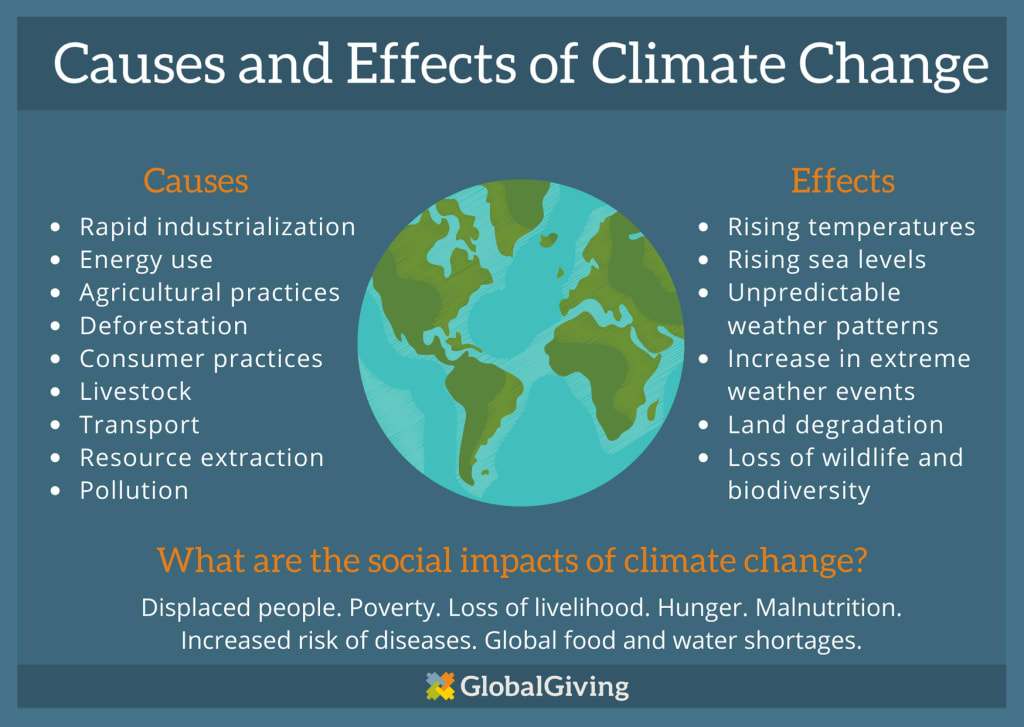Understanding Climate Change: Causes, Effects, and Solutions.
Climate

Climate change refers to the long-term alterations in the Earth's climate patterns, including temperature, precipitation, and wind patterns, among others. It is primarily caused by human activities, and it has significant impacts on the natural world and human societies worldwide. In this article, we will explore the causes, effects, and solutions to climate change.
Causes of Climate Change
The primary cause of climate change is the release of greenhouse gases (GHGs) into the atmosphere, primarily carbon dioxide (CO2), methane (CH4), and nitrous oxide (N2O). Human activities such as burning fossil fuels, deforestation, and agriculture significantly contribute to the increase in GHG emissions. These gases trap heat in the Earth's atmosphere, leading to an increase in global temperatures, which is known as the greenhouse effect. The increase in temperatures causes a chain of effects that affect the natural world and human societies.
Effects of Climate Change
Climate change has already caused significant impacts on the environment and human societies. Some of the effects of climate change include:
Extreme Weather: Climate change has caused an increase in the frequency and intensity of extreme weather events such as floods, droughts, hurricanes, and wildfires. These events have severe consequences on human lives and the economy.
Sea Level Rise: The melting of glaciers and polar ice caps due to global warming is causing a rise in sea levels. This rise is threatening the existence of low-lying areas and small island nations.
Food Insecurity: Climate change is affecting agricultural productivity, leading to a decline in food production and an increase in food prices. This effect is causing food insecurity in many parts of the world.
Biodiversity Loss: The increase in global temperatures is causing the loss of habitats and species. Many species are struggling to adapt to the changing climate, leading to a decline in biodiversity.
Health Impacts: Climate change is causing an increase in heat-related illnesses, respiratory diseases, and the spread of vector-borne diseases such as malaria and dengue fever.
Solutions to Climate Change
The effects of climate change can be mitigated by implementing solutions that reduce greenhouse gas emissions and enhance the capacity of natural and human systems to adapt to the changing climate. Some of the solutions to climate change include:
Renewable Energy: Transitioning to renewable energy sources such as solar, wind, and geothermal power can significantly reduce greenhouse gas emissions.
Energy Efficiency: Improving energy efficiency in buildings, transportation, and industry can reduce energy demand and, consequently, GHG emissions.
Forest Conservation: Protecting forests and promoting reforestation can enhance carbon sequestration, reducing GHG emissions and biodiversity loss.
Sustainable Agriculture: Promoting sustainable agriculture practices such as agroforestry and reducing food waste can enhance food security and reduce GHG emissions.
Climate Adaptation: Investing in climate adaptation measures such as building seawalls and improving water management can help reduce the impacts of climate change.
Carbon Pricing: Implementing carbon pricing mechanisms such as carbon taxes or cap-and-trade systems can provide incentives for reducing GHG emissions.
Conclusion
Climate change is a global issue that requires collective action to mitigate its effects. The causes of climate change are primarily human activities that release greenhouse gases into the atmosphere. The effects of climate change are severe and affect the environment and human societies. However, solutions to climate change such as transitioning to renewable energy, improving energy efficiency, and promoting sustainable agriculture practices can mitigate its effects. Implementing these solutions requires collaboration among governments, businesses, and individuals to achieve a sustainable future.
In addition to these solutions, education and awareness-raising can play a critical role in addressing climate change. Educating individuals on the causes and effects of climate change and providing them with the tools and resources to take action can lead to meaningful change. Moreover, individuals can make small changes in their daily lives, such as reducing energy consumption, using public transportation, and reducing meat consumption, which can contribute to reducing GHG emissions.
Governments and businesses have a significant role to play in addressing climate change. Governments can create policies and regulations that encourage the transition to renewable energy, promote sustainable practices, and incentivize climate action. Additionally, businesses can adopt sustainable practices and invest in renewable energy to reduce their carbon footprint.
International cooperation is also crucial in addressing climate change. The United Nations Framework Convention on Climate Change (UNFCCC) aims to reduce global GHG emissions and promote sustainable development. The Paris Agreement, adopted in 2015, is a legally binding agreement under the UNFCCC that aims to limit global warming to below 2°C above pre-industrial levels and pursue efforts to limit the increase to 1.5°C. The agreement requires countries to regularly report on their emissions and efforts to reduce them.
In conclusion, climate change is a pressing issue that requires immediate action. The causes of climate change are primarily human activities that release greenhouse gases into the atmosphere, leading to severe effects on the environment and human societies. However, solutions such as transitioning to renewable energy, improving energy efficiency, promoting sustainable practices, and investing in climate adaptation can mitigate the effects of climate change. Addressing climate change requires collaboration among governments, businesses, and individuals, as well as international cooperation. Education and awareness-raising are also essential in driving climate action and achieving a sustainable future.
About the Creator
Jeno Trashan
Story writer Jeno Trashan creates captivating tales filled with adventure, emotion, and imagination. A true lover of words, Jeno weaves unforgettable stories that transport readers to far-off lands.






Comments
There are no comments for this story
Be the first to respond and start the conversation.